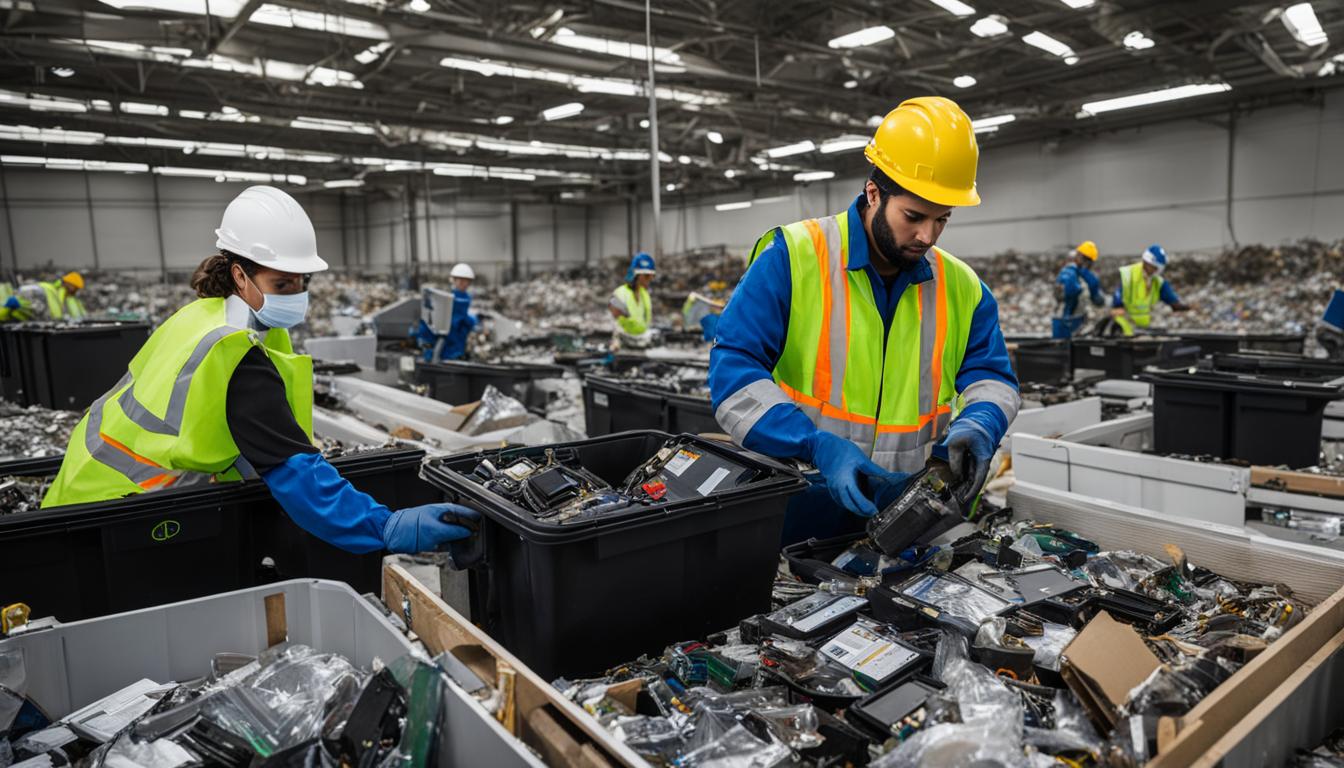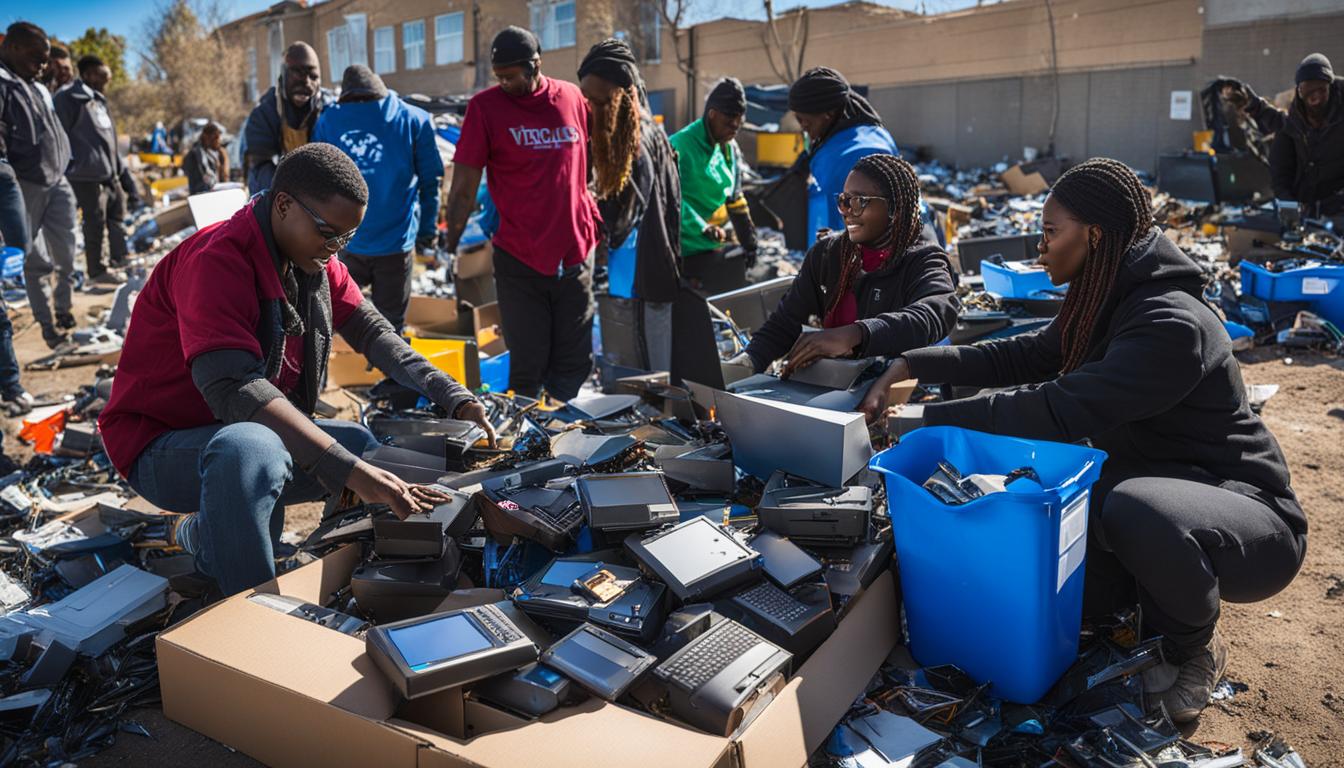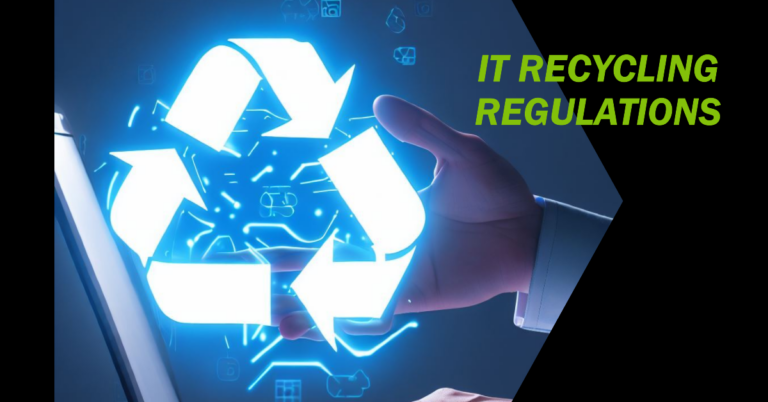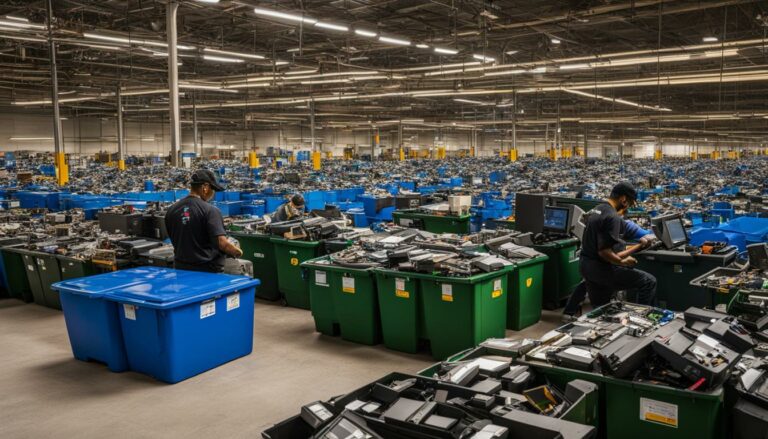Decentralised IT Recycling: Opportunities and Challenges
Decentralised IT recycling presents significant opportunities for sustainable IT solutions and efficient e-waste management. In a world where electronic waste has become a pressing environmental concern, decentralised recycling offers a promising way forward. With the increasing production of plastic waste and the challenges faced by Africa in waste management, it is crucial to adopt eco-friendly recycling services that address the plastic waste crisis.
Key Takeaways
- Decentralised IT recycling allows for greener and more efficient e-waste management.
- Plastics, including electronics, contribute significantly to environmental pollution.
- High-income countries have advanced recycling facilities, while Africa faces challenges due to a lack of infrastructure.
- Recycling rates need to increase, and consumer behavior plays a crucial role.
- Decentralised IT recycling offers advantages such as sustainability and community engagement.
The Rise of Decentralized IT Recycling
Decentralized IT recycling has emerged as a promising solution for effective e-waste management. By leveraging digital technologies and smart contracts, decentralized recycling platforms enable individuals and businesses to dispose of their electronic waste in an eco-friendly manner. This innovative approach addresses the challenges associated with traditional centralized recycling models, such as transportation costs and reliance on centralized facilities.
Decentralized IT recycling aims to provide localized recycling solutions that are closer to the source of waste generation, reducing the need for extensive transportation. This not only improves resource efficiency but also minimizes waste production, contributing to environmental sustainability. By automating the provision of recycling services without intermediaries, decentralized IT recycling platforms streamline the recycling process and make it more accessible for individuals and businesses.
With the increasing volume of electronic waste globally, decentralized IT recycling offers a scalable and efficient method to tackle the e-waste management challenge. By adopting decentralized and sustainable solutions, we can promote a circular economy and ensure the proper disposal of electronic waste, contributing to a greener and more sustainable future.
Table: Comparison of Centralized and Decentralized IT Recycling
| Aspect | Centralized IT Recycling | Decentralized IT Recycling |
|---|---|---|
| Transportation | Requires extensive transportation of electronic waste to centralized facilities. | Enables localized recycling solutions, reducing the need for long-distance waste transportation. |
| Resource Efficiency | May result in higher resource consumption due to transportation and logistics. | Improves resource efficiency by minimizing waste production and optimizing recycling processes. |
| Accessibility | May be limited to specific geographical areas with advanced recycling facilities. | Provides accessibility to recycling services for individuals and businesses on a broader scale. |
Advantages of Decentralized IT Recycling
Decentralized IT recycling offers several advantages over traditional recycling methods. Firstly, it promotes sustainability by reducing the carbon footprint associated with transportation and logistics in centralized recycling models. By enabling localized recycling solutions, it minimizes the need for long-distance waste transportation. This not only reduces greenhouse gas emissions but also conserves energy and resources.
Secondly, decentralized IT recycling provides eco-friendly recycling services, ensuring that electronic waste is disposed of properly and safely. With the increasing concern about data security, decentralized platforms also offer secure computer disposal and data destruction services. This is essential for organizations that want to protect sensitive information and comply with data privacy regulations.
A decentralized approach to IT recycling also allows for efficient handling of electronic waste on a smaller scale, minimizing the risk of improper disposal and environmental contamination. By empowering individuals and communities to participate directly in the recycling process, decentralized systems can foster community engagement and raise awareness about the importance of proper waste management.
Table: Advantages of Decentralized IT Recycling
| Advantages | Description |
|---|---|
| Promotes Sustainability | Reduces carbon footprint and conserves energy. |
| Eco-Friendly Recycling Services | Proper disposal and data destruction for electronic waste. |
| Minimizes Risk of Improper Disposal | Ensures environmentally responsible handling of waste. |
| Community Engagement | Empowers individuals and raises awareness about waste management. |
Overall, decentralized IT recycling offers a sustainable and community-driven approach to e-waste management. By leveraging these advantages, organizations and individuals can contribute to a greener future while ensuring the proper disposal of electronic waste and protecting sensitive data.

Challenges and Considerations in Decentralized IT Recycling
Decentralized IT recycling brings numerous advantages to the table, but it also presents its fair share of challenges and considerations. One of the primary challenges is ensuring the proper sorting and recycling of different types of electronic waste. Without accurate identification and segregation of components, the potential value and recoverable materials from e-waste may be overlooked.
Another significant consideration for decentralized IT recycling platforms is the need for trust and transparency in verifying the quality and reliability of recycling services. To ensure that electronic waste is being recycled appropriately and in an environmentally responsible manner, robust mechanisms must be in place.
Furthermore, navigating the regulatory landscape surrounding decentralized IT recycling is crucial. Implementing and enforcing regulations and policies that govern and monitor these platforms are essential to protect the environment and ensure compliance with recycling standards. This approach will help maintain the integrity of decentralized IT recycling systems.
Lastly, as the volume of electronic waste continues to increase, scalability becomes a key concern. Robust infrastructure and adequate capacity are vital to handle the growing demand for sustainable IT solutions. Without these in place, decentralized IT recycling may struggle to keep up with the ever-growing e-waste problem.
Conclusion
Decentralized IT recycling provides a promising solution for effective e-waste management. By harnessing the power of digital technologies and smart contracts, decentralized recycling platforms automate recycling services and offer sustainable IT solutions. These platforms not only promote environmental sustainability but also provide eco-friendly options for computer disposal and data destruction.
While decentralized IT recycling offers numerous advantages, it also presents challenges that need to be addressed. Proper sorting and identification of different electronic waste types are essential to maximize resource recovery. Ensuring the quality and reliability of recycling services is crucial to maintain trust and transparency in the process. Additionally, regulatory frameworks and scalable infrastructure are vital to ensure compliance with recycling standards and handle the increasing volume of e-waste.
With the growing need for greener and more efficient e-waste management, decentralized IT recycling plays a significant role in advancing the circular economy. By adopting decentralized and sustainable solutions, we can address the plastic waste crisis and create a better future for our environment. By embracing decentralized IT recycling, we can contribute to the reduction of electronic waste and promote a more sustainable future.
FAQ
What is decentralized IT recycling?
Decentralized IT recycling is a method of e-waste management that leverages digital technologies and smart contracts to automate recycling services without the need for intermediaries.
Why is decentralized IT recycling important?
Decentralized IT recycling offers opportunities for greener and more efficient e-waste management, reducing the carbon footprint associated with transportation and logistics in traditional centralized recycling models.
How does decentralized IT recycling promote sustainability?
By enabling localized recycling solutions, decentralized IT recycling minimizes the need for long-distance waste transportation, thus reducing the environmental impact and promoting resource efficiency.
What services does decentralized IT recycling provide?
Decentralized IT recycling provides eco-friendly recycling services, including proper disposal and safe destruction of electronic waste, such as computer disposal and data destruction.
What are the challenges in decentralized IT recycling?
One challenge is ensuring the proper sorting and recycling of different types of electronic waste. Additionally, verifying the quality and reliability of recycling services and addressing regulatory frameworks are considerations in decentralized IT recycling.
How can decentralized IT recycling be scaled up?
Robust infrastructure and adequate capacity are essential to handle the growing volume of electronic waste and meet the increasing demand for sustainable IT solutions.













